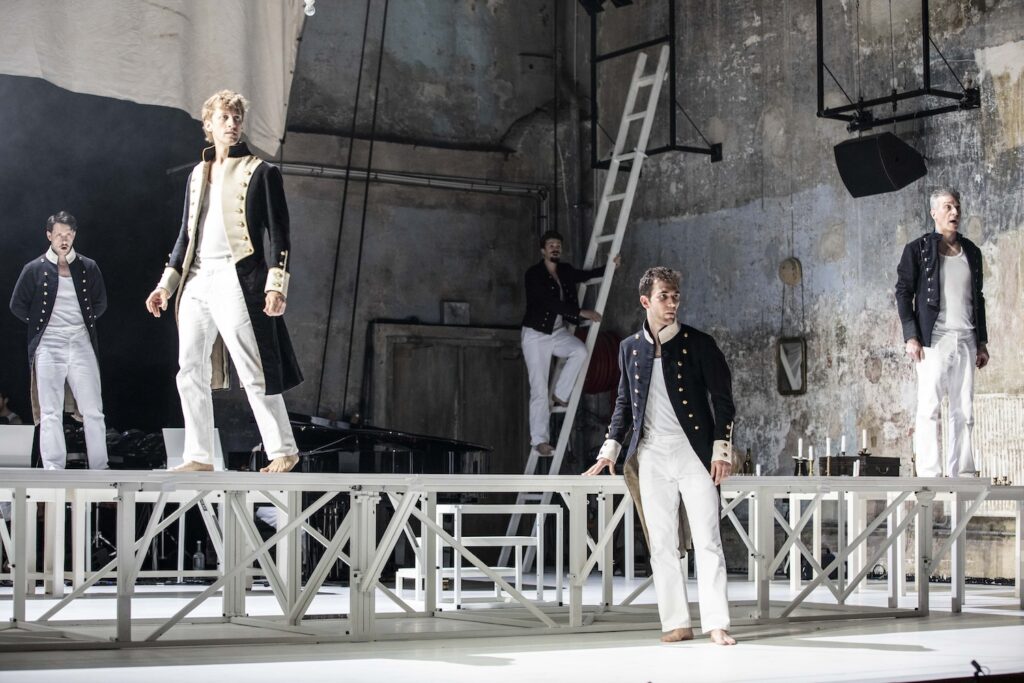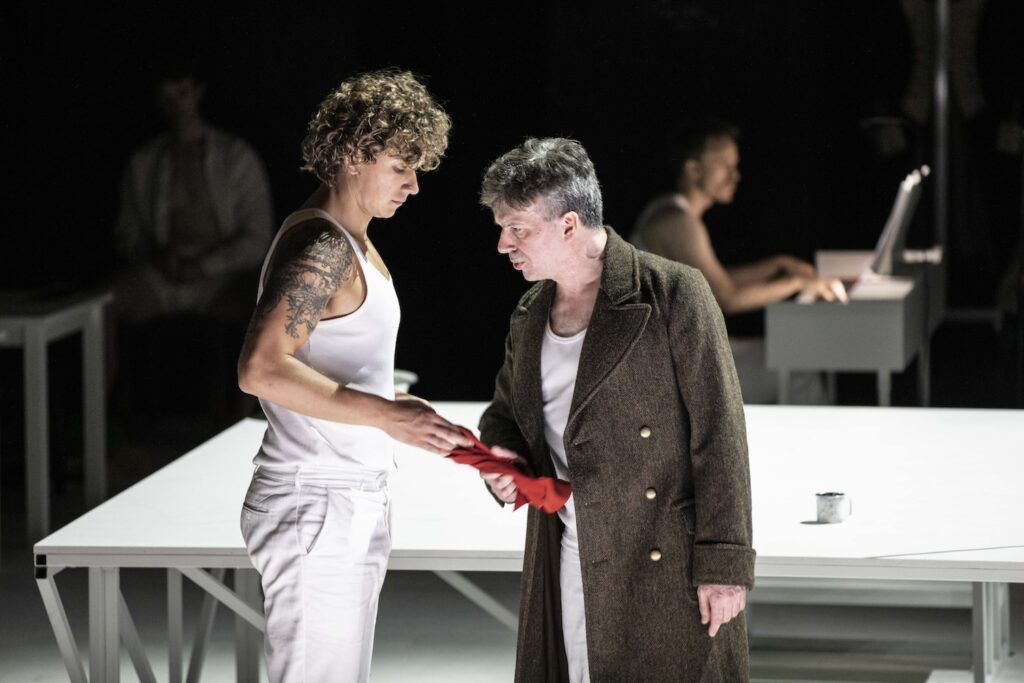“After Benjamin Britten,” the title continues. Thus a twentieth century masterpiece was reduced to its twenty-first century essentials — six singers, three keyboards, percussion, a platform and a sail.
The singers, in loose fitting pants and shirts, did enact multiple roles, donning officers’ doublets, rags, wigs and beards as needed. The onstage band members also took a few roles.
In the end Billy Budd — hung — swung from a halyard, and swung and swung some more.
The Britten orchestral score, recast by British composer Oliver Leigh, was effected by the myriad, digitalized sounds possible from amplified electronic keyboards. The players, barely visible, were seated behind a narrow, high platform that traversed the stage of the tiny Théâtre du Jeu de Paume. The singers were vocally (and physically) very present on, or in front of the platform. There was constant percussion punctuation.

The result was a monochromatic wall of forceful sound that was present for the opera’s one hour, forty five minute, intermission-less duration.
American stage director Ted Huffman adapted the Britten opera for these forces, imagining the costuming, the wigs and beards, the minimal scenic structures as well, and effecting a highly complex staging for this sad, brutal story.
The theater piece’s libretto was largely or completely derived — and abridged — from that of the Britten opera. Its librettists, E.M. Forster and Eric Crozier offered composer Britten floods of underlying, repressed feelings that were absent in the Huffman and composer Leith telling. Missing as well was any orchestral lament that beauty and goodness cannot exist. In its place was a contemporary take on the Melville novella, finding overt homosexuality, enjoying the spectacle of unjust punishment, and a rethinking of the story in current, strictly theatrical terms.
Mr. Huffman did indeed create a slick theater-piece, from the initial swinging of the theater’s “ghost” bulb (the lone bulb that illuminates an empty theater) to the extended swinging of Billy Budd in its place. Meanwhile there was an impressive display of story telling through quick costume changes and truly fine acting (and singing) by an obviously committed cast.

Billy Budd was played by American baritone Ian Rucker, a member of the Lyric Opera of Chicago’s young artist program. Though of tall and robust figure Mr. Rucker made a boyish Billy Budd (lots of curly blond hair) who delivered a fine, felt adieu to the world.
Contrary to the opera’s tittle, Billy Budd is really about Edward Fairfax Vere, the captain of the British vessel The Indomitable, who maybe could have, but did not save Billy Budd. Captain Vere was played by American tenor Christopher Sokolowski (lead photo) who, like Mr. Rucker, is a University of Indiana laureate. Mr. Sokolowski is however a young artist, ill-equipped to find the forlorn stature of the morally ruined Captain Vere. In its place he offered a beautifully sung, indeed a very artfully sung prologue and epilogue to the story of Billy Budd, this artistry integral to Mr. Huffman’s obvious pursuit of the art of art.
Australian born, San Francisco-finished bass baritone Joshua Bloom played the story’s villain, John Claggart, the Indomitable’s hated Master of Arms. Mr. Bloom brought maturity and authority to Claggart, his personal and artistic attributes that took this role above the artifice of the production. A talented actor Mr. Bloom also played the old sailor Dansker who brought a felt humanity to Billy’s last moments of life.
Like all the cast, except Billy Budd, Mr. Sokolowski (Captain Vere) played an additional role, that of the sniveling, corrupt and pitiful Squeak, transforming himself seamlessly from the moral high ground of Captain Vere to the lowest, squalid world of a snitch. Irish tenor Hugo Brady played the role of the Novice, the victim of a ruthless beating, befriended by Billy, then romantically involved with Billy, before being forced to betray Billy. Mr. Brady also played La Grand’Hune.
The first and second mates were played by Israeli baritone Noam Heinz, a member of the Studio of the Berlin Komische Opera, and British baritone Thomas Chenhall who is currently participating in the young artist program at the Aix Festival. Both are excellent singing actors who also took the roles of Mr. Redburn and Mr. Flint respectively.
The lead keyboardist/conductor of the stage band was British conductor Finnegan Donnie Dear. Additional keyboard players were British pianist Richard Gowers and Welsh pianist Siwain Rhys. Percussion was in the hands of British drummer George Barton.
The arty lighting was effected by French lighting designer Bertrand Couderc.
Michael Milenski
Théâtre du Jeu de Paume, Aix-en-Provence, France, July 7, 2025
All photos © Jean-Louis Fernandez, courtesy of the Aix Festival.